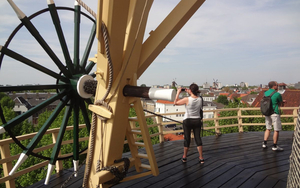The Tongue - Chiu-Yu Chou; Sirens - David Kidane; The Maps of Days Outworn - Nina Whiteman; Serisu - Aaron Parker; Sonnet Machine - Tom Coult; Excerpts from Romeo and Juliet - Sergei Prokofiev
SHAKESPEARE 400, the commemorative year of all things Bard, has definitely kicked off. And this is the sort of concert that makes one happy that the BBC exists.
It is a fearsomely exciting thing to hear live, the strident strings and horns countering: there is an effect of massive emotions being heaved to and fro
The second half was excerpts from Prokofiev’s marvellous ballet score, Romeo and Juliet, the first, five brand new commissions from young (born between 1981 and 91) Manchester-linked composers. These pieces were written, in part, to accompany plays broadcast on Radio 3 over the weekend, all of which were inspired by specific sonnets (29, 61, 73, 140 and 153) and are loosely set in a 24 hour period in Manchester streets, nightclubs and offices. Do seek them out on the Beeb iPlayer.
The music as presented here was anything but incidental though. At times there was a sense of the creators being let loose in a massive toy box, as the shakers, clappers, celeste, cowbells, tom toms, bongos, bowed drums, wind machines and unearthly sound effects – blown but unkeyed flutes, tapped mouthpieces etc. – were scattered across the stage.
Though the five eight minute pieces were surprisingly cohesive, albeit individually distinctive. A straw poll afterwards saw various different favourites being claimed. Mine edged toward Aaron Parker’s serisu, with its glittering surfaces, reminiscent of a hypnotic Steve Reich piece, being propelled every now and again by delicate motifs from the leader’s violin. Nina Whitehorn’s composition was described, approvingly, ‘as every 1950s sci-fi’ theme, and Daniel Kidane’s Sirens, taking its lead from Manchester’s clubs was energetic and rhythmic … if not ‘relentlessly propulsive’ as the programme notes would have it.
Sonnet machine was a formalist exercise, following a Spenserian rhyme scheme (well, I guess Edmund knew William), taking in Alan Turing’s sonnet writing machine, but was certainly intriguing with its repeated whip cracks from a pair of hinged wooden clappers. The Tongue, which kicked it all off, based on a rather grisly example of ‘tonguing’ and jealousy was a low level growl. I’m not sure that the unkeyed flutes and the whole orchestra tapping their instruments as one constituted ‘physical desire’, but it was exceptionally well played.
Andrew Gourley, the young conductor, appeared to be in complete control of the subtle, oftentimes amorphous soundscapes. The sonnets inspiring the plays tend toward the more wrangled effects of jealousy but the pieces themselves portrayed a rather uncertain, indeterminate air. But Gourley’s angular, staccato movements reflected the music. He also seemed to enjoy, as did the orchestra, the aerobic release afforded by the long muscular lines of the booming, powerful ‘Montagues and Capulets’ that opened the Romeo and Juliet excerpts. It is one of those pieces that has broken free of its moorings – Beethoven’s Fifth, Sugar Plum Fairy etc. – and is the current soundtrack of The Apprentice. It is a fearsomely exciting thing to hear live, the strident strings and horns countering: there is an effect of massive emotions being heaved to and fro. Given that I don’t watch the TV show, the piece was undimmed by overfamiliarity.
‘The Death of Tybalt’ (we had seven pieces from the 52 that Prokofiev wrote) was a raucous motoric delight, bombastic and crackingly well executed. And the finales were tragic with, to my ears, an apposite adolescent undertone. The fact that this orchestra played such different, difficult pieces with such verve and panache should never be taken for granted.
Go listen to the plays, listen to Maxine Peake reading the sonnets, listen to the concert, listen to the music … and listen to the BBC Phil play Shostakovich’s Fifth Symphony tonight (29 April).














